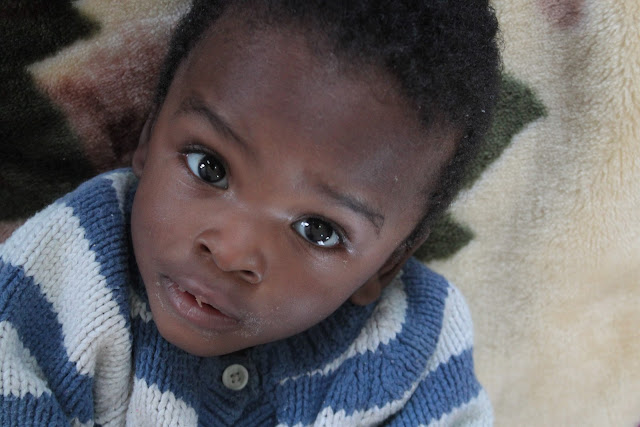If I know a song of Africa,
of the giraffe and the African new moon lying on her back,
of the plows in the fields,
and the sweaty faces of the coffee pickers,
Does Africa know a song of me?
- Karen Blixen
Yet, despite the efforts of Happy Life, the need is great and the workers are few. Crowded rooms crammed wall-to-wall with cribs and crying babies has become the standard for Happy Life. The older children share their twin-sized beds with one, sometimes two other children. While the caretakers hustle from crib to crib, changing diapers and feeding bottles, the other babies are left to sit idle in their cribs and wait for their turn to be cradled - if only for just a few short moments. As a result, opportunities for healthy developmental growth are missed every day.

of the giraffe and the African new moon lying on her back,
of the plows in the fields,
and the sweaty faces of the coffee pickers,
Does Africa know a song of me?
- Karen Blixen
The day has finally come for me to spread open and explore the other hidden corners of the world that shelter children with disabilities. Filled with resolve and a pinch of uncertainty, I have come to find myself standing in the warm heart of Africa - in a world unlike anything I have ever experienced.
Several months ago, a chance email to an organization called Choose to Invest quickly developed into a planned trip to Nairobi, Kenya where their Kimbilio Project is being planted. Born out of a desire to provide Kenya's abandoned disabled children with a place of refuge, nurture and care, the Kimbilio Project aims to build a unique living facility that lifts such children out of the mire. Additionally, another initiative of Kimbilio is rooted in providing partnering orphanages with the support and training they need to better serve their own abandoned children.
With the collaboration of Choose to Invest, I had the honor of visiting and serving in one of Kimbilio's partnering orphanages called Happy Life Children's Home. Standing as a beacon in the midst of crumbling abandon, Happy Life openly accepts infants and young children that are discarded from their mothers. Oftentimes, these children are found in the slums of Nairobi, swaddled in dirty wet blankets and wrapped in plastic bags. Discovered outside of hospitals, city buses, and ditches - the children of Happy Life are taken in and given new hope.
Yet, despite the efforts of Happy Life, the need is great and the workers are few. Crowded rooms crammed wall-to-wall with cribs and crying babies has become the standard for Happy Life. The older children share their twin-sized beds with one, sometimes two other children. While the caretakers hustle from crib to crib, changing diapers and feeding bottles, the other babies are left to sit idle in their cribs and wait for their turn to be cradled - if only for just a few short moments. As a result, opportunities for healthy developmental growth are missed every day.
On my second day at Happy Life, I held a brief and simple training session for the leaders and head nurses. I went over some practical activities they could do with the babies to support their development as well as some simple recommendations of ways they could re-structure their time and resources to create more interaction with the children. Using one of their toddlers as an example, I showed them simple methods for helping the children learn new skills such as sitting up, rolling over, and holding their head up. To our amazement, in the middle of the session, our model baby named Abidah instinctively sat up by himself. "I've never seen him do that before!", said Rosemary, one of the nurses. "He learned how to sit up just by playing with him - I can't believe it!!!" Suddenly there was a charge of energy in the room - it was as if lights had been switched on within their very eyes.
I don't know if I will ever step through the gates of Happy Life again - or if I will ever hold little Abidah close and tell him that he is loved. And I will never know the actual impact of that day. But walking away from that place - nestled in the warm heart of Africa - I walked away knowing that I had left behind something profound. I had left behind tools of knowledge that will forever change how the nurses and staff care for these precious, abandoned children of Africa.










